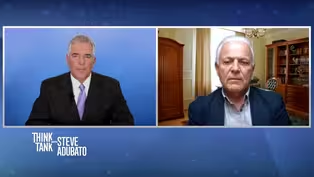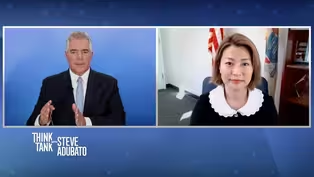
The Role of Higher Ed in Political and Social Discissions
Clip: 1/20/2024 | 9m 7sVideo has Closed Captions
The Role of Higher Ed in Political and Social Discissions
Peter J. Woolley, Ph.D., Founding Director of the School of Public and Global Affairs at Fairleigh Dickinson University, talks with Steve Adubato about the role of higher education in political and social discussions and the current state of our democracy.
Problems playing video? | Closed Captioning Feedback
Problems playing video? | Closed Captioning Feedback
Think Tank with Steve Adubato is a local public television program presented by NJ PBS

The Role of Higher Ed in Political and Social Discissions
Clip: 1/20/2024 | 9m 7sVideo has Closed Captions
Peter J. Woolley, Ph.D., Founding Director of the School of Public and Global Affairs at Fairleigh Dickinson University, talks with Steve Adubato about the role of higher education in political and social discussions and the current state of our democracy.
Problems playing video? | Closed Captioning Feedback
How to Watch Think Tank with Steve Adubato
Think Tank with Steve Adubato is available to stream on pbs.org and the free PBS App, available on iPhone, Apple TV, Android TV, Android smartphones, Amazon Fire TV, Amazon Fire Tablet, Roku, Samsung Smart TV, and Vizio.
Providing Support for PBS.org
Learn Moreabout PBS online sponsorship- We're now joined by Dr. Peter Woolley, Founding Director of the School of Public and Global Affairs at Fairleigh Dickinson University.
Good to see you, my friend.
- Good to see you, Steve.
Thanks for letting me be here.
- Well, it's been too long, and this school that you are involved in, this particular program at Fairleigh Dickinson is more important now than ever.
Question.
And I know this sounds like a weird question, but as the graphic Democracy in Danger comes up, we just did an interview with Governor Murphy that you may have known about, and I asked, "Is democracy in danger?"
And hundreds of people on different social media sites saying, "Adubato, we're not a Democracy, we're a Republic."
And I'm like, "Yeah, I know, I know, I get that part."
But is the question, "Is democracy in danger?"
the inappropriate question 'cause we're not a democracy?
- No, I think that's a perfectly appropriate question.
It's also true that we're a Republic.
We're a Democracy that's limited by a whole complication of processes, which are meant actually to limit the dangers of democracy that is the dangers of people to themselves.
So the Framers who wrote the Constitution were well aware of many examples of democracy in action, beginning with ancient Athens where things went wrong, where people basically, in a democratic fashion, drove the bus right off a cliff.
- So the term populism, right?
- Yeah.
- Is that what you just referred to, Peter?
First of all, what is populism, A?
And B, why is populism potentially dangerous for democracy?
- Populism is an oversimplified view of, and usually an emotional view, of sometimes complicated events.
And what we do with populism when it becomes dangerous is we amplify it.
Populism in the United States has always been with us and will always be with us.
However, in the past, it's been really limited to local geographies, and the authors of The Federalist Papers would've argued that one of the brilliant consequences of the Constitution they produced was that it would keep the conflagrations, meaning the populous wildfires contained in the state structure.
It's not really happening that way anymore.
We have nationalized local politics.
- Speaking of nationalizing local politics, let's internationalize, let's globalize, if you will, because it's the School of Public and Global Affairs.
Question, Peter, you've been at this for a long time.
You headed up the FDU poll, which, reputation speaks for itself, very well-respected.
- Thank you.
- Question.
How tough is it to have meaningful, honest, candid, respectful, civil dialogue about international affairs these days, particularly as it relates to the Israeli-Hamas conflict?
- It's very tough.
It's very, very tough.
And remember, at root, the human being is an animal.
And at root, that animal is very emotional.
So the whole trick to being the best human being you can is to harness those emotions.
It is to control them when you can and enjoy them when it's appropriate.
When it comes to strongly emotional, complex, deeply meaningful international conflicts like the one we're witnessing now between Israel and Hamas, it's natural that people are gonna become so engrossed that the conflict will increase rather than decrease.
- But Peter, along those lines, what do you see?
Again, we're taping this program in the middle of December.
It'll be seen in 2024.
We just saw congressional testimony of three Ivy League presidents.
- We did.
- Not sure as this, when this airs how many will still be presidents.
Question.
- Right, right.
- What do you see as the role of higher education in providing a safe, civil, respectful platform for these discussions where people feel safe to be who they are, to say what they believe without fear of violence?
- Yeah, that is the role of universities, to provide that appropriate arena for debate, for argument, and for learning.
I think a lot of people would say universities have not done a good job at that, even though their best intentions are to provide that safe space.
The safe space is not to protect people from other people's speech.
The safe space is to have the argument in, and to learn from it, and to grow in your ability to debate effectively.
Universities, I think, have erred on the side of safe space, rather than on the side of, "Let's have it out and let's learn how to do it right."
And I think when those presidents went into, fronted by members of Congress, they were academics, rather than speaking to some very practical political balances that needed to be addressed.
- You know, Peter, you've said, and I think you told our producers this.
But if I'm wrong, correct me.
We're talking about Donald Trump, Democracy in Danger.
And you said, "Look, many people think if Trump went away, the problem would go away too."
But 74 million people voted for him in 2020.
- That's right.
- That whatever that is ain't going away if Donald Trump is not on the national scene.
Help folks understand that and why that's important, Peter.
- So the conversation is often about Donald Trump as the cause of this problem.
Donald Trump is the symptom of the problem.
74 million people who embrace a person who has repeatedly repudiated democratic norms, they are the problem.
They're at least, in part, the problem.
Now, that's not necessarily a new problem, but it has come to a crescendo here with the election in 2020, '16 of a guy who said he wouldn't accept the results if he lost.
That was- - I'm sorry for interrupting, Peter.
Given what former President Trump has said about a...
If he were to be elected in 2024, A, joking or not, not sure about being a dictator; B, getting back at those who he believes have aggrieved him, opposed him, what do you believe a potential second term for former President Trump would mean to our Representative Democracy-slash-Republic?
- Well, I think I will just say in general, you ain't seen nothing yet.
The retribution, and the incompetence, and the ideologues will spark a conflict that we haven't experienced probably since the 1960s.
Now, that's why I say this isn't this...
The wheels have come off or nearly come off before.
In my lifetime and yours, that was the 1960s with the conflagration of the Vietnam War with missteps of the national government in so many ways, all kinds of environmental changes taking place in the political environment, in technology.
We're in that place again.
- Peter Woolley is the professor... Peter Woolley is the Founding Director of the School of Public and Global Affairs at Fairleigh Dickinson University.
Peter, I promise we'll be back to continue these important conversations with you.
All the best to you and the folks at FDU.
- Thank you, thank you very much.
- You got it.
Stay with us, we'll be right back.
- [Narrator] Think Tank with Steve Adubato has been a production of the Caucus Educational Corporation.
Funding has been provided by The New Jersey Economic Development Authority.
RWJBarnabas Health.
Johnson & Johnson.
Veolia, PSE&G, New Brunswick Development Corporation.
Operating Engineers, Local 825.
Eastern Atlantic States Regional Council of Carpenters.
The Turrell Fund, a foundation serving children.
And by these public spirited organizations, individuals and associations committed to informing New Jersey citizens about the important issues facing the Garden State.
And by Employers Association of New Jersey.
Promotional support provided by Northjersey.com and Local IQ.
Meadowlands Chamber.
Building connections, driving business growth.
Do you know someone who's done something extraordinary for others, whether a community service or an act of heroism.
That person may be a candidate for the Russ Berrie Award for Making a Difference.
Help us pay it forward by honoring New Jersey's unsung heroes in their efforts to make a difference in the lives of others.
Sen. Pennacchio Provides His Stance on Parental Rights
Video has Closed Captions
Clip: 1/20/2024 | 9m 49s | Sen. Pennacchio Provides His Stance on Parental Rights (9m 49s)
Asw. Ellen Park: The First Korean American in NJ Legislature
Video has Closed Captions
Clip: 1/17/2024 | 9m 6s | Asw. Ellen Park: The First Korean American in NJ Legislature (9m 6s)
Providing Support for PBS.org
Learn Moreabout PBS online sponsorship
- News and Public Affairs

Top journalists deliver compelling original analysis of the hour's headlines.

- News and Public Affairs

FRONTLINE is investigative journalism that questions, explains and changes our world.












Support for PBS provided by:
Think Tank with Steve Adubato is a local public television program presented by NJ PBS

